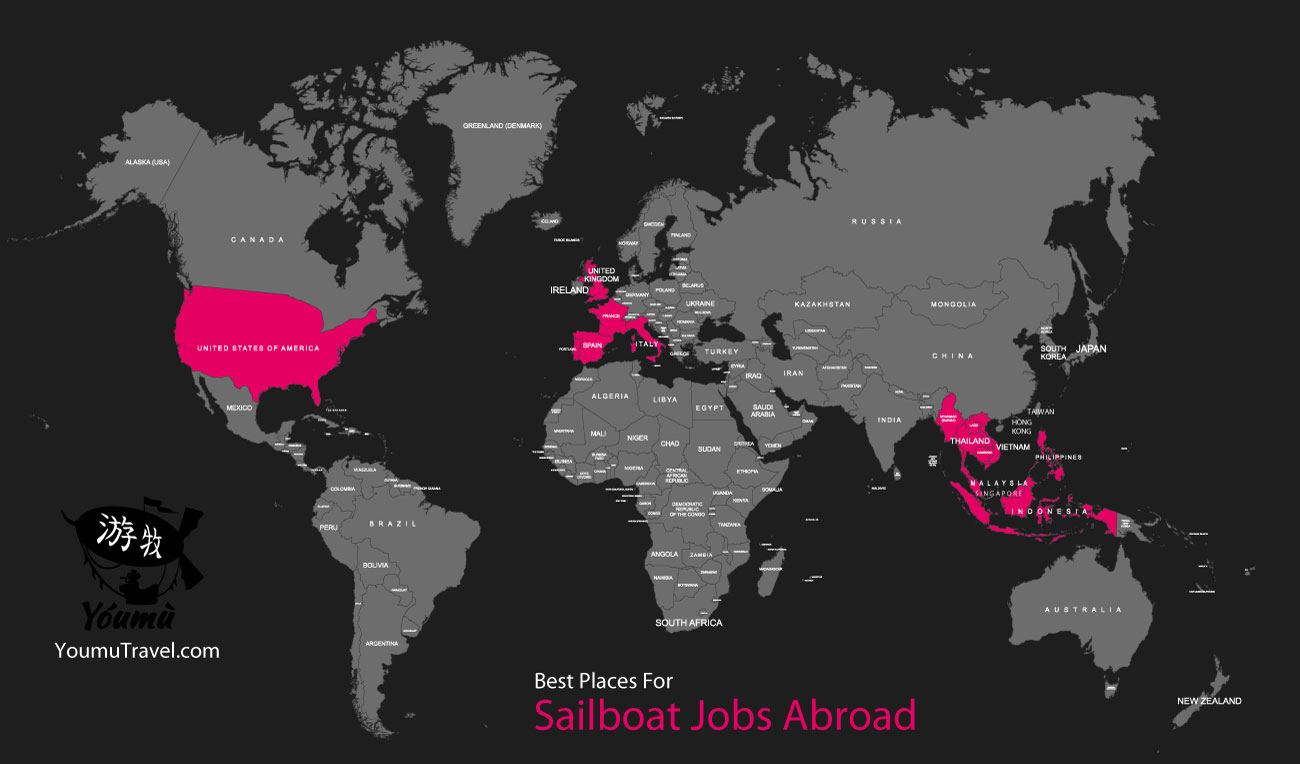Sailboat Jobs Abroad – Guide
People who work sailboat jobs are part of the boat’s crew and they aid in everyday tasks and duties in terms of navigation, cleaning, maintenance, and food.
This job is easy to get.
Demand
- High Demand
Experience & Degree
- No Experience Required
- No Degree Required
- Native English Speaking Preferred
Citizenship
- No Restrictions
The pay is low but the job provides consistent work.
Pay Range
- Hourly: $10-$25/hr.
Reliability
- Consistent Work
Housing
- Housing Not Provided
This job provides some schedule freedom and great location flexibility.
Location
- Work Anywhere
Schedule
- Flexible
Language
- Can get by with English only
Who can get Sailboat Jobs?
Anyone that is passionate about the sea and is ready to be in hard work as well as working long hours as part of a team, can work get a sailboat job. There are two certifications you’ll need to get- STCW Basic Safety Training and ENG1 Seafarer Medical Certificate. The best part is you won’t need experience to get a position either.
What are the responsibilities for Sailboat Jobs?
People who work sailboat jobs need to keep the vessel and crew running as well as possible, and there are many tasks that go into this.
Key Responsibilities
- Clean and ensure all equipment and areas are hygienic.
- Conduct maintenance on the vessel/equipment.
- Cook responsibly.
- Do night shifts as scheduled.
- Aid in navigation when needed.
What’s the typical schedule for Sailboat Jobs?
It’s a 24/7 job with long hours with days that could be up to 20 hours long. You’ll be the first up in the mornings and the last person to go to bed. Some trips can last 10-25 days at a time. It’s also a seasonal job so expect slow months.
Low Hourly Rate: $10.00
Average Hourly Rate: $17.00
High Hourly Rate: $25.00
Income Reliability
In general, working on a sailboat is a reliable job that provides a constant stream of work.
Typical Job Duration
Working on a sailboat can be short-term or long-term.
Estimated Hours Per Week
It’s estimated that you can work full time, 40 hours per week, working on a sailboat.
Room & Board
Working on a sailboat typically provides room & board.
Sailboat Jobs – Country Map

The Best Places For Sailboat Jobs
Most major countries throughout the world have opportunities for those seeking sailboat jobs. Here are some of the best places for sailboat jobs.
- US
- UK
- Italy
- France
- Spain
- Portugal
- Pacific islands
- SE Asia
Garner Experience.
You’ll need to get as much experience as you get if you’re passionate about the sea and working on a boat. If your friends own a boat, work for them, or attend sailing lessons whenever you can. You’ll also want to study nautical vocabulary.
Pick the right moment.
You’ll increase your chances of working on a boat if you’re in the right place at the right time so you’ll need to know where to be and when. Most boats will be in the Mediterranean like places such as Croatia, Greece, Italy, etc for the summer before heading to Morocco or the Canary Islands in September or October. If you’re wanting to be on one of these boats, you’ll want to be at Las Palmas de Gran Canaria and Santa Cruz de Tenerife between October and December because that’s when they get ready to cross the Atlantic. Lanzarote is another location to be in September to December when boats arrive from the Mediterranean.
Find a ride.
There are three main methods to find a position on a boat- internet, personal contact at the harbor, or networking. None of them are the “best” way to get a position and it depends on what kind of experience you’re looking for as well as luck and your effort. You should try all three for the best chances.
- Personal Contact. Print off plenty of copies of your resume and walk up and down the docks at the harbor. You’ll want to be there early, around 8 am, to catch people raising their flags on their yachts to talk to them more easily and hand them a resume. Ask if they need any help that day.
- Network. Boats will reach out to their network of people first and if they can’t find anyone that meets their qualifications, then they’ll look online or in the harbor. You’ll want to build up your network by spreading the word about your skills and what you’re looking to do through friends and utilizing social media. Also, check out the Ocean Nomads fleet and talk to those who have gone before you or are already out there.
- Internet. There are plenty of resources online for you to check out to learn the skills you need and to find positions that are a great fit for you. It also helps in being able to reach out and make connections for your network. Here are a few websites that will help you research openings.
Apply.
It’s going to take a while for you to get answers so you’ll need patience, but don’t be afraid to be consistent in reaching out to boat owners and searching for new opportunities. It’s important to be respectful, honest, and humble when speaking to boat owners because you’re not only asking for a job but to be welcomed into their home.
Save up.
Many yachts ask that you pay for your food which can range from 10 to €15 per day and you’ll be on the water for 15 to 25 days, depending on the weather and boat. This means you’ll need around 150 to €300 for the crossing alone. Some boats, especially bigger yachts where you’ll scrub the deck and polish their railing, food will be included. However, during the ARC regatta, boats can ask you to pay up to €50 per day due to high inscription fees.
Gather equipment.
You’ll want to own a head torch, waterproofs, and good shoes. They’ll be expensive but they’re important to have and sometimes the boat you’ll be working on might provide them. The Canary Islands are cheaper compared to mainland Europe, but in Gibraltar, there are sailor’s “jumble sales” so you might save quite a bit. Also, be sure to have your passport or ID when traveling.
Get the appropriate documentation.
Be sure to research if you need a visa for the places you are visiting before departure. You’ll also want to go to the Immigration offices to get our passport stamped a day or two before you leave. Typically, each port will have its own immigration office but if not, then you will need to go to the nearest airport to do so.
How do I get a sailing job?
Some tips on how to get sailing experience include: attending a sailing course at a local ASA school, embark on a skippered or bareboat charter, and get as much practice in as possible with a local club or school.
How do you get a yacht job with no experience?
To be able to get a yacht job without experience you need a bit of luck–to be in the right place at the right time–but you also need a professional, thorough resume, to register with the Luxury Yacht Group, to take basic STCW courses, and to network by building references and maintaining contact.
Where can I get a free sailboat?
Check out these places to find a free sailboat:
- Gone – 42 Irwin Center Cockpit (Labelle FL)
- Sailboat on stands (Elkton MD)
- 2 boats with engines (Rosenberg TX)
- 1974 Yorktown 39 (Fallbrook CA)
- 24 sailboat on trailer (Ottsville MA)
- Escape Captiva Sailboat (South Shore MA)
- 28 Catalina Sailboat (Tracys Landing MD)
- Multiple boats need homes (Tracy’s Landing MD)
How much do yacht workers make?
A yacht worker with prior experience can make around $3,500 to $6,000 a month without tips, but someone without experience will earn somewhere from $2,000 to $3,000 a month. Tips range from 5 to 15% of the cost of the charter per week which is divided amongst the crew.
Do yachties get paid a salary?
Yes, yachties get paid a salary. As a bosun, you can expect to make $48,000 to $52,000 on a smaller vessel but on the larger ones, you can earn almost $60,000.
How do deckhands get paid?
Deckhands earn from 1.5% to 10% of the adjusted gross catch which is all decided on location and the skills the workers have.
Is yachting a good career?
Yachting is a good career if you enjoy traveling and being out in the water for weeks to months at a time. You also have to take into consideration that it’s more of a seasonal job so expect slow months. The traditional yachting season in the Mediterranean is from April to September while in the States and the Caribbean, it runs from November until April.
Is it hard to get a job on a yacht?
It takes hard work and long hours as part of a team as well as an interest in learning and being flexible. If you can do all of that, you’ll be in a good spot to land a position on a yacht.
What qualifications do you need to work on a superyacht?
To work on a superyacht, you will need these two certificates:
- STCW Basic Safety Training.
- ENG1 Seafarer Medical Certificate.
What is a good size sailboat to live on?
The good size of a sailboat to live on is 30-32’ and should be easy for single handling too.
Is owning a sailboat worth it?
Buying a used sailboat isn’t always expensive, but you’ll be paying more into maintenance and mooring, but if it’s something you’re really interested in, it’s rewarding to learn and you have your own boat!
How much is a cheap sailboat?
When buying a used sailboat, you’re going to spend an average of $20,000. A brand new 36’ cruiser is approximately $150,000 but a used on is only about $40,000. Plus the maintenance cost will be between $3,000 to $7,000.
Do yachties get paid salary plus tips?
Yes, yachties make both a salary and tips, but you’re going to take a lot of abuse and have to put in hard work for the tips. It’s worth it though, with collective tips reaching almost $30,000. One crew made $168,000 in tips alone in one season according to Bravo.
Do below deck cast get paid?
Yes, below deck cast get paid and actually make pretty decent money. Second and third stews earn around $50,000 per season, chefs are looking at $52,000 to $72,000, a bosun makes $52,000, deckhands will earn anywhere from $40,000 to $52,000 and a captain makes the most at $120,000.

